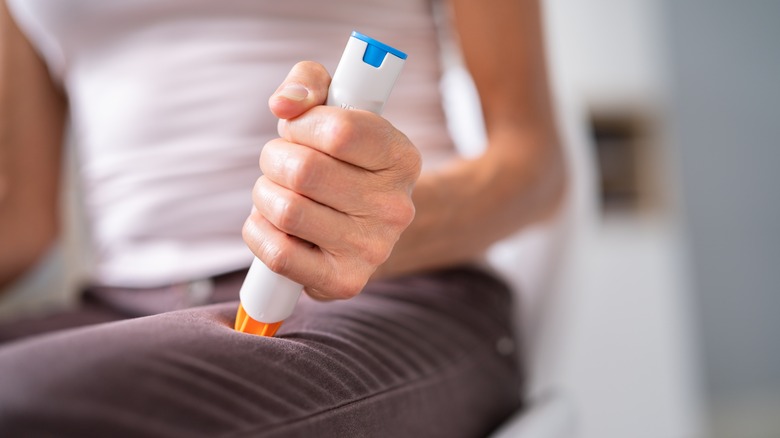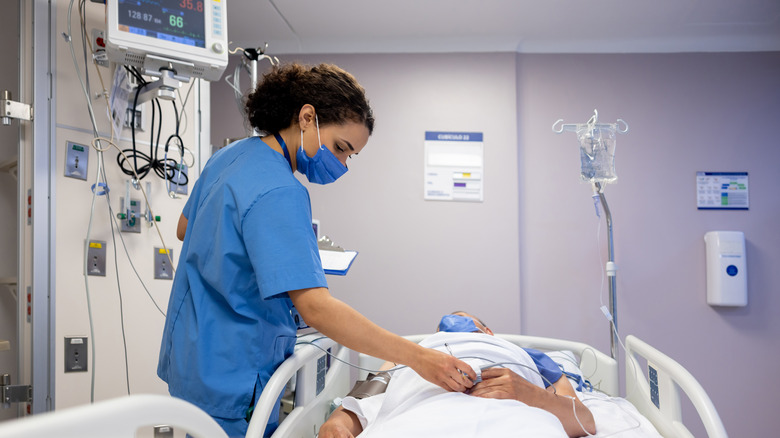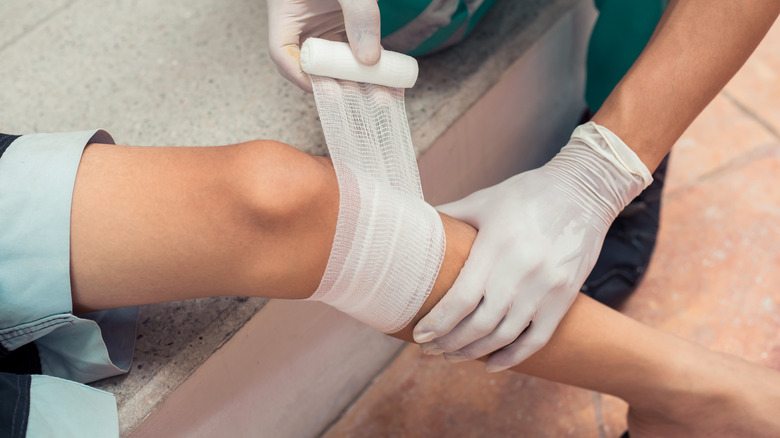Unexpected Ways Adrenaline Can Save Your Life
You've probably heard of the fight or flight response in your body. It occurs when your body perceives danger, and you either stand your ground and fight or run like you've never run before. That rush of energy that gives you the ability to fight like you've never imagined in your kickboxing class or run at speeds you didn't think were possible for your body is called "adrenaline."
Adrenaline, which is sometimes also referred to as "epinephrine," is a hormone created by your adrenal gland at the top of the kidney, states the Cleveland Clinic. When you need it, adrenaline is quickly released into your blood. It happens fast, which is why you call it an adrenaline rush. Adrenaline is a neurotransmitter that sends messages to all your nerve cells. For example, it opens your airways so it's easier to get air to your lungs, directs blood into your muscles, and makes your awareness more acute.
When you need to think quickly, adrenaline can save your life. However, it can do more than just prepare you to deal with a perilous situation. Adrenaline medication can be used during a medical emergency to get your heart started, reverse an allergic reaction, stabilize your blood pressure, and stop bleeding. We'll dive into these unexpected ways adrenaline can help you live to see a new day.
Adrenaline can reverse anaphylaxis
According to the Asthma and Allergy Foundation of America, more than 100 million Americans experience various types of allergies yearly. Additionally, allergies are listed as the sixth leading cause of chronic illness in the U.S. So, allergy sufferers are not alone.
An allergic reaction is when your body's immune system overreacts to a common substance. For example, people can have allergies to dust, dander, food, insect stings, medications, pollen, chemicals, etc. While most allergic reactions are mild and controlled with antihistamines, some reactions lead to anaphylaxis, where the airways constrict when encountering the allergen. Anaphylaxis is more common among food and bite allergies. The first line of treatment against anaphylaxis is a shot of adrenaline. It works by binding to different receptors, which open the airways, relax your breathing, and suppress histamine release, explains Allergy & ENT Associates.
Those with severe reactions carry an adrenaline auto-injector, like EpiPen, with a single shot of adrenaline administered in the middle of the outer thigh (per Anaphylaxis UK). These injectors should always be carried in case of an emergency. Those with severe allergies might also wear a wristband, indicating allergy issues.
Adrenaline can restart the heart
Your heart keeps you alive (literally). Without your heart beating to move blood through your body, your organs, including your brain, quickly shut down. Some people experience a sudden cardiac arrest, which causes their heart to stop beating due to an irregular rhythm, states the Mayo Clinic. When this happens, their breathing stops, and they lose consciousness. Immediate medical treatment is needed to get their heart pumping again. Emergency medical responders use various methods, including cardiopulmonary resuscitation (CPR), automated external defibrillator, and adrenaline, to get their heart going.
A shot of adrenaline is given to the patient because it " increases arterial blood pressure and coronary perfusion during CPR via alpha-1-adrenoceptor agonist effects," according to a 2013 study in Current Opinion in Cardiology. Therefore, it causes an increase in systolic blood pressure and heart rate, which allows the pulse to return and reverses the cardiac arrest. The National Institute for Health and Care Research found that 3.2% of the patients whose hearts returned with adrenaline survived the next 30 days. Additionally, 2021 research published in Health Technology Assessment found adrenaline administered to help restart the heart outside of the hospital improved the long-term survival of patients.
Time is of the essence for adrenaline shots for sudden cardiac arrest, so the adrenaline is given as a shot right through a central vein. It might also be given as an intracardiac injection right into the heart, per Access Emergency Medicine.
Adrenaline can stabilize blood pressure
People land in the intensive care unit (ICU) for various reasons. It could be that they have a heart disorder or have recently had a life-saving surgery. Whatever the case, their body typically isn't functioning at its best, including their blood pressure. ICU patients can experience low blood pressure when the systolic pressure is below 90 and the diastolic is below 60. According to the Mayo Clinic, extremely low blood pressure can also be part of shock. This condition causes confusion, coldness, discoloration, and shallow breathing, which can be dangerous for ill patients.
Providers in a hospital setting can use adrenaline to help bring the blood pressure up. Adrenaline binds to specific receptors that increase the bumping of the heart, so oxygen gets to major organs in the body faster. This allows more blood to flow through the veins. Adrenaline also constricts the walls of the blood vessels, increasing the pressure. The rise in blood pressure ensures areas like the brain and kidneys aren't damaged, per Boston Children's Hospital.
Adrenaline is typically only given during life-threatening low blood pressure situations. Using too much or at the wrong time can make the problem worse and even cause hypertension, according to "A Practice for Anesthesia for Infants and Children."
Topical adrenaline can stop bleeding
Anytime the barrier of the skin gets a wound that's deep enough, blood will leak out. Shallow wounds ebb eventually after pressure is applied and blood clotting agents have done their job. However, deep wounds and surgery can lead to excessive bleeding that all the pressure in the world isn't going to stop. Therefore, healthcare professionals might use adrenaline topically to stop uncontrolled bleeding, per a 2023 article in the British Dental Journal. In fact, a 2023 study in Chest Journal found that adrenaline was 86.7% effective in controlling moderate bleeding and 40% effective in controlling severe bleeding.
When given intravenously, adrenaline is a vasoconstrictor, meaning that it works to constrict the muscles of the blood vessels, which is why it can increase blood pressure. Applied topically or to a local area, adrenaline works as a vasoconstrictor on the blood vessels in the specific area of the wound making them narrow and slowing the amount of blood loss. Since ephedrine can have undesired consequences on the heart and other areas of the body, the authors of a 2020 study in the World Journal of Plastic Surgery suggest a low dose of 1:1,000,000 injected into the area. In addition to local injections, adrenaline-soaked gauzes can also limit blood loss, per a 2020 study found in BCM Musculoskeletal Disorders.




